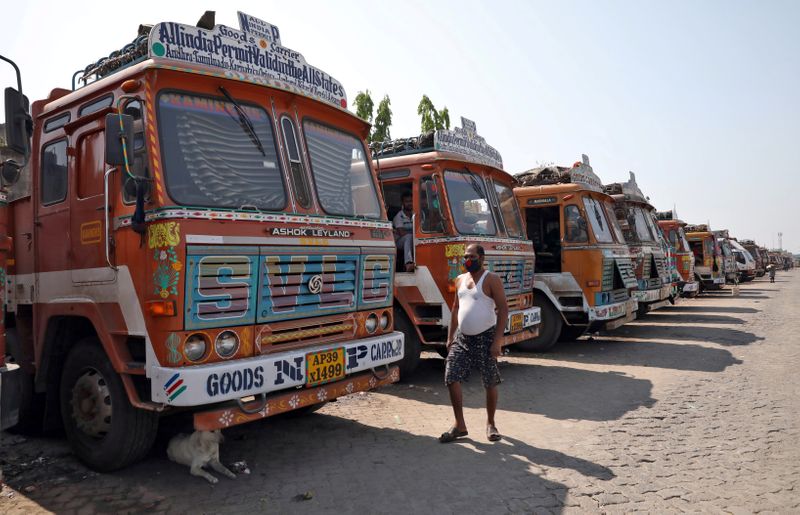By Aditi Shah and Rajendra Jadhav
NEW DELHI/MUMBAI (Reuters) - Indian truck driver Arju Yadav says he was on a 30-40 km (20-25 mile) journey earlier this month to deliver a consignment of biscuits when he was stopped by police for defying a coronavirus lockdown, beaten and made to do sit-ups.
India had exempted truckers carrying food, medicine and other essential items from the nationwide lockdown that started on March 25, but in many cases, the message had not gone through to police on the highways and officials at state border checkpoints.
Restaurants and repair shops along highways are also mostly closed, despite government approval this week to open them, further throwing the sector into turmoil. For the trucks that do operate, loading and unloading times have spiked because of a lack of workers.
Industry bodies estimate only about 20% of India's roughly 9.8 million trucks are currently operating - either due to a lack of drivers or because demand from manufacturing and other industries has come to a halt. The $130 billion domestic trucking industry ships roughly 60% of the nation's freight.
Globally, freight movements by road were down about 30-40% at the end of March, the International Road Transport Union has said.
About a dozen truck drivers who spoke to Reuters in India said despite empty roads, it was taking longer to make deliveries due to non-availability of food and repair shops, slow loading of goods and in some cases, harassment by police.
They said hundreds of thousands of drivers, many of whom fear catching the virus as well, have fled to their villages, slowing movement of goods, pushing up freight rates and causing logjams at ports and warehouses.
Yadav said he continues to show up for work, carrying his own stove and supplies to cook, but the police harassment is worrying.
"I travel the same route every few days but I am stopped and checked each time. After being beaten up I am now scared to work but have no choice as I need to earn for my family," the 22-year-old said.
The trucking sector is one of the hardest hit by Prime Minister Narendra Modi's lockdown and the ripple effects of its paralysis have crippled India's farm economy, disrupted the pharmaceutical supply chain and wreaked havoc around the delivery of groceries and other goods nationwide.
With harvesting of winter crops in full swing this month, this shortage could cause massive harm to the agriculture-dependent economy.
As the government prepares to lift the lockdown in phases, the demand for trucks will increase but transport companies say the big challenge will be convincing drivers to return to work, even with higher salaries and allowances on offer.
LONG DISRUPTION
The disruption will continue even after the lockdown is lifted and is likely to take another a month or two to settle, said Pradeep Singal, chairman of the All India Tranporters' Welfare Association, which represents nearly 65% of India's organised road transport business.
"There's still fear and panic among drivers," he said.
The lack of truck drivers has already decimated India's $100 billion horticulture sector while pushing up retail prices of fruit and vegetables.
Growers have started to dump produce on the road, said P. Chengal Reddy, secretary general of the Consortium of Indian Farmers Association.
Sandesh Patil, who grows the renowned Alphonso mangoes in the western town of Alibag, said every year there is high demand across the country for the fruit.
"This year we couldn't send mangoes due to non-availability of trucks," said Patil, adding that when transport does become available, it is too expensive.
The disruption has also hit pharmaceutical players, delaying shipments of medicines and protective health gear.
Medikabazaar, a business-to-business seller of medical supplies, has even struggled to get consignments to hospitals due to a shortage of trucks, said Chief Executive Vivek Tiwari.
In once instance, it took 11 days - three times longer than usual - to transport virus-related medical supplies to a hospital in the southern city of Bengaluru from Delhi after two transport companies failed to find drivers. Tiwari said he eventually had to turn to India's postal department for help.
GETTING THEM BACK
Even with limited movement of goods so far, freight costs have spiked by up to three times for long distances as orders are erratic and trucks would often need to return empty, said Sachin Haritash, CEO of logistics technology platform Mavyn.
Mavyn connects consumer goods companies like Marico (NS:MRCO) and Hindustan Unilever (NS:HLL) and pharmaceutical firms like Zydus (NS:ZYDS) with transport providers, and Haritash said he is already seeing a reluctance by drivers to do long distances.
The costs could further rise with the government planning to gradually open some industries in coming weeks, and transport providers still struggling to convince drivers to come back.
Truck driver Kehar Singh says he has returned to his village in Himachal Pradesh state and plans to stay there for a while - at least until his employer can guarantee a safe and clean working environment.
"If there is safety and food then I will come back sooner or I can try my hand at farming for a few months," he said.
